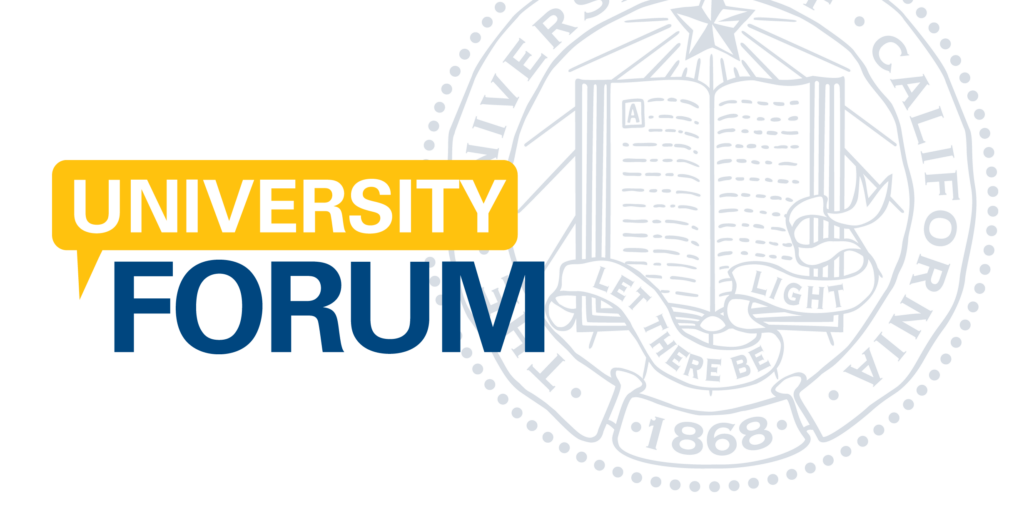Elections: What They Are Good For
Democracy, Dilemmas & Decisions
Election series looks at critical moment in time. The November 2020 election provides an historic opportunity to shape our future, both in California and the nation. The race for presidential and congressional races stand to fundamentally shape the future of race relations, environmental protections, immigration reform, healthcare and health disparities, employment conditions and labor regulation, along with efforts to address the pandemic. Propositions on the ballot in California have the potential to dramatically shift our tax system, affirmative action, courts and criminal justice system, voting eligibility and enfranchisement, labor relations and housing policy.
In this University Forum series we will be asking key questions such as:
- How have social movements, on both the left and the right, shaped what is at stake in this election?
- What institutional barriers to democracy exist in our political system, and what are the current opportunities to address them?
- How have patterns of civic engagement in elections and outside of elections shaped what is at stake in this election?
- How does the past inform the present, both in prefiguring the political choices placed to voters on 2020 ballots and establishing political precedents? What lessons and past precedents inform public opinion, political choices and political possibility in the present? What if the 2020 election forces us to face aspects of American politics without precedent?
Election Series Forums
In this series, we aim to reflect on the issues at stake in the 2020 elections in the context of longer term struggles for democratic accountability, racial justice, equal citizenship, and economic equality. Join the conversation as UC Santa Cruz professors engage with community organizers, political advocates, and other scholars. Moderated by Chris Benner, Director of the Institute for Social Transformation and Professor of Environmental Studies and Sociology.

Hope, Fear, and Desire for Democracy on the Eve of an Election
September 15, 2020 5:30-7:00 pm
with Dean Mathiowetz, Deborah Gould, and Cristina Beltrán
More Event Information
Event Description:
Elections offer the spectacle of democracy being “exercised,” but political theorists and activists are attuned as well to the ways the electoral process channels and confines democratic energies. To some, 2020 feels different. The COVID pandemic and the widespread uprisings against white supremacy and police violence have pried open space for imagining politics otherwise. In this discussion we will explore the potential in this unsettling of conventional politics.
Featured Speakers:
Dean Mathiowetz
Dean Mathiowetz is an Associate Professor of Politics at UC Santa Cruz. He received B.A. Summa Cum Laude, Economics and Political Science from the University of Minnesota and his masters and his Ph.D. in Political Science from University of California at Berkeley, He is a political theorist with interests in democratic theory, the history of political economy, philosophy of language, and the politics of “mindfulness”. He is the author of Appeals to Interest: Language and the Shaping of Political Agency and numerous articles; he is currently working on a book project on the relation of luxury culture and democracy, including the reflections of ancient Greek thinkers on this relation.
Deborah Gould
Deborah Gould is an Associate Professor of Sociology at UC Santa Cruz. She received her B.A., in Government from Wesleyan University and her PhD from the University of Chicago in Political Science. She was a postdoctoral Harper-Schmidt Fellow in the Society of Fellows in the Liberal Arts at the University of Chicago, 2000 – 2004. She is currently working on a second book, also about political emotion, called Composing Collectivities: Appetite, Encounters, and the Not-Yet of Politics. Her research interests are political and affect, social movements and contentious politics, classical and contemporary social theory, sexualities, lesbian/gay/queer studies, feminist and queer theory.
Cristina Beltrán (Porter, ’92)
Cristina Beltrán is an Associate Professor in the Department of Social & Cultural Analysis and Director of Graduate Studies at New York University. She received her Bachelor’s from the University of California at Santa Cruz in Politics and her Ph.D. from Rutgers University in Political Science. She is also an occasional commentator on MSNBC. From 2001 until 2011, she taught in the Political Science Department at Haverford College; in 2013-14, she was a resident member at the Institute for Advanced Study in Princeton, N.J. Her new book Cruelty as Citizenship: How Migrant Suffering Sustains White Democracy is out this month with the University of Minnesota Press.

Elections, the Constitution, and Institutional Reform
September 23, 2020, 5:30-7:00 pm
with Daniel Wirls and Kathay Feng
More Event Information
Event Description:
For many, the national elections are about defending and strengthening the integrity of our elections and constitutional government. From gerrymandered districts to the electoral college to the structure of the Senate itself, we have a range of institutions and processes that provide disproportionate representation, with significant implications for the nature of our democracy and for racial equity. Will the national elections be able to address these problems or will they become the ultimate expression of the threat to the Constitution and our democracy? If the nation successfully turns this historic corner, should Americans be solely concerned with new policies in such areas as health care and climate change, or is the Constitution itself and our electoral processes in need of repair to avoid such threats in the future and to advance democracy and policies that address the array of formidable problems we face?
Featured Speakers:
Daniel Wirls
Daniel Wirls is a Professor of Politics at UC Santa Cruz. He received his PhD in Government from Cornell University in 1988 and has been teaching at UC Santa Cruz ever since. Dr. Wirls’s research interests range across American politics, institutions, public policy, and political history. He has published work on the founding period and the early Senate, antebellum representation in the Senate and House, the Seventeenth Amendment, Cold War and post-Cold War military policy, and contemporary political transformations. He is currently working on an analysis of national security as a policy arena and a critique of the Senate, with an emphasis on the nature and consequences of Senate representation and procedures.
Kathay Feng
Kathay Feng is the National Redistricting Director of Common Cause where she works to challenge partisan and incumbent gerrymandering. She is a graduate of Cornell University, and holds a law degree from UCLA School of Law. Kathay has been an activist and civil rights attorney in California for more than 20 years. She serves, or has served, on numerous boards including the California Secretary of State’s Advisory Committee on Voter Participation and Outreach, the LA County Human Relations Commission, and the Asian Pacific Policy and Planning Council. Before joining Common Cause in 2005, she headed the Voting Rights and Anti-Discrimination Unit at the Asian Pacific American Legal Center.

California: Changing Demographics, Youth, and Integrated Voter Engagement
October 5, 2020, 5:30-7:00 pm
with Veronica Terriquez, Randy Villegas, Mindy Romero, Martin Higuera, and Ines Garcia
More Event Information
Event Description:
This session will explore how demographic changes—particularly within the larger Latin@ population and youth—have shifted politically in California. We’ll review research models of integrated voter engagement linking voting and community work.
Featured Speakers:
Veronica Terriquez
Dr. Veronica Terriquez received her Ph.D. in Sociology at UCLA, her Masters degree in Education at UC Berkeley, and her B.A. in Sociology at Harvard University. She is the principal investigator of the California Young Adult Study and Youth Leadership and Health Study. Her research examines how individuals’ demographic characteristics reproduce or challenge patterns of social inequality. Much of her research has implications for policies affecting low-income, immigrant, and Latino communities. Dr. Terriquez has prior experience working as a community organizer and volunteers for various education reform, immigrant rights, labor rights, and racial justice efforts.
Research Interests: Immigrant Incorporation, Civic Engagement, Social Inequality, Latinos in the US, Youth Transitions to Adulthood, Quantitative Methods, Mixed Methods.
Randy Villegas
Randy Villegas is a PhD student in the Politics department at UC Santa Cruz. Villegas earned his B.A. in Political Science at CSU Bakersfield in 2017 with a minor in history, and his Associates Degree in Political Science from Bakersfield College in 2015. Before beginning graduate school Villegas worked as a journalist and an organizer in Bakersfield, CA where he helped lead the 2016 Social Justice series, and the 2017 May Day Resistance march in Bakersfield. He is currently featured in the California State Capitol Museum, in their ‘Unity’ exhibit for his work around social justice issues in Kern County. Villegas has also worked on several political campaigns, and is currently serving as an elected delegate to the California Democratic Party, representing the 32nd assembly district.
Mindy Romero
Mindy Romero is the founder and director of the Center for Inclusive Democracy (CID), formerly known as the California Civic Engagement Project. Romero is a political sociologist and holds a Ph.D. in Sociology from UC Davis. Her research focuses on political behavior and race/ethnicity, and seeks to explain patterns of voting and political underrepresentation, particularly among youth and communities of color in California and the U.S. She is currently an adjunct fellow of the Public Policy Institute of California (PPIC) and former member of their Statewide Survey Advisory Committee. Romero is a member of the California Secretary of State’s Taskforce on the Voter’s Choice Act. She is the former Chair of Mutual Housing California and former Vice-Chair of the Social Services Commission for the City of Davis.
Martin Higuera
Martin Higuera is a first-generation American, son of immigrants from Mexico, and a lifelong resident of Bakersfield, California. Motivated by a feeling of being unrepresented by his Congressman for most of his life, Higuera has been heavily involved in his community and the political process since he was twelve. He began the young democrats clubs in high schools across the Kern High School District. Throughout his high school career, he has helped organize a number of voter registration drives and successfully registered hundreds of young people to vote. In the 2018 midterms, Martin actively worked to elect Democrats across Kern County by canvassing, phone banking, and helping train and recruit others as well. He has no intention of ending his involvement in the political process: he is just getting started.
Ines Garcia Carreno
Ines Garcia Carreno is Oaxacan by blood and Mercedian at heart. She obtained her B.S in Management and Business Economics from UC Merced in 2017. As a former farmworker, she wanted to give back to my community to lift up the voices of those who too often get left behind. To combat unfairness and lack of resources in the Central Valley, she joined 99Rootz as a youth organizer where she empowered young people to create change in their communities to build a safer and more prosperous Central Valley for themselves and others through community and electoral organizing efforts throughout high school chapters, regional convening, summer academies and campaigns. She plans to pursue an MBA and climb up the leadership ladder as an indigenous woman of color in the for-profit sector to bridge the gap for those that are left behind, the low income, and underrepresented groups and make opportunities more accessible.

California: Our Criminal Justice System and Political Possibilities
October 19, 2020, 5:30-7:00 pm
with Anjuli Verma, Craig Haney, and Erin Haney
More Event Information
Event Description:
This session connects increased incarceration in the 1980s and 1990s to racist policies and politics at the time, with Black Lives Matter and movements on reform and abolition now, to Prop 16 (affirmative action). The focus of the discussion will be on three of the 12 total California Statewide Voter-initiated Propositions appearing on the November 2020 ballot: Prop 17 which would restore right to vote for people convicted of felonies who are on parole, Prop 20 which restricts parole for nonviolent offenders and authorizes felony sentence for certain offences and is currently treated as a misdemeanor; and Prop 25 a referendum to overturn a 2018 law that replaced money bail system with a system based on public safety.
Featured Speakers:
Anjuli Verma
Anjuli Verma joined UC Santa Cruz in July 2018 as an Assistant Professor in the Politics Department. Professor Verma received her Ph.D. in Criminology, Law and Society from UC Irvine and her B.A. in Political and Social Thought from the University of Virginia. Her research broadly engages questions of punishment and inequality, regime change, and the interplay of legal reform and politics in the governance of crime and punishment. Professor Verma previously worked as a policy advocate and communications strategist on drug policy and criminal justice reform issues at the American Civil Liberties Union.
Craig Haney
Craig Haney is an American social psychologist and Professor of Psychology at UC Santa Cruz, noted for his work on the study of capital punishment and the pyschological impact of imprisonment and prison isolation. He has a Bachelor’s degree in Psychology from the University of Pennsylvania, a Master’s and Ph.D. in Psychology and a J.D. in Law from Stanford University. Craig Haney’s research concerns the application of social psychological principles and data to various legal and civil rights issues. He has specialized in the assessment of institutional environments as well as study of social histories of persons accused or convicted of serious violent crimes, and has worked on the way that attitudes and beliefs about crime and punishment are changed by legal procedures, as well as the role such attitudes and beliefs play in influencing legal fairness and impartiality.
Erin Haney
Erin Haney spent 10 years as an attorney protecting the rights of indigent clients at all levels of our broken justice system. Erin received a Bachelor’s degree in Psychology from UC Santa Cruz and a J.D. from the UC Davis School of Law. Erin has worked as an investigator at the Santa Cruz Public Defender’s Office, a trial attorney at the San Francisco Public Defender’s Office, and a death penalty attorney at the Habeas Corpus Resource Center. Erin currently focuses on reforming the criminal justice system through legislation as Senior Counsel at #cut50 and Policy Director at REFORM Alliance. Erin has led the successful passage of several state criminal justice bills (many in CA) and was integral to the passage of the federal First Step Act, a prison and sentencing reform bill.
Election Series Video Library:
Presented by:




